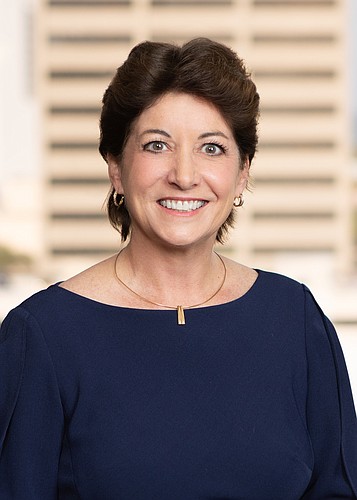- January 14, 2025
-
-
Loading

Loading

An unexpected boom in demand has led a prominent law firm in Sarasota to expand.
The firm is Shumaker and it’s added an attorney and paralegal to its real estate and development team to help address the ongoing demand caused by a red hot market.
Driving the need to grow is an increase in the number of commercial leases, both for retail and office properties, that are being signed, says Jan Pitchford, who is a partner and is Shumaker’s regional service line leader for its real estate and development practice.
“I’ve been doing this 30 some years. I’ve never had so many lease transactions at one time,” she says. “Which to me is a really good sign.”
This is on top of the work the firm does for residential and developer clients, which has also increased.
That there is such a demand for office leases is surprising given that most people anticipated companies would cut back on space coming out of the pandemic as employees continued working remotely. But that’s just not happening, Pitchford says. She says companies still are looking to put all employees in one space and many are looking to jump into new developments. And it’s not just office space. Restaurants and retailers are picking up space in droves as well.
The trend is similar in Tampa, she says.
“We’ve just become inundated with commercial-type work, which is wonderful,” she says. “We’re very surprised because it was hard to predict what was going to happen coming out of the pandemic.”
While a post-pandemic boom in office and retail space in encouraging, the way the deals are being structured is changing, a sign that, while bullish, companies remain vigilant.
Pitchford says the lease terms aren’t as long as they were before and that there are shorter renewal periods. “Everybody,” she says, “is more cautious about lengthy, long-term leases. But landlords are definitely out there renting spaces.”
Shumaker, founded in 1925, has a team of more than 270 lawyers and lobbyists. The firm has seven offices, located in Toledo and Columbus, Ohio; Tampa and Sarasota; Charleston, S.C.; Charlotte, N.C., and Bloomfield Hills, Mich.
The firm lists real estate as one of its core practices, focusing on everything from 1031 exchanges to eminent domain to development and financing to portfolio management. Pitchford is one of five real estate and development regional service line leaders at Shumaker.
“Everybody is more cautious about lengthy, long term leases. But landlords are definitely out there renting spaces.” Jan Pitchford, a partner at Shumaker and regional service line leader for its real estate and development practice
The expansion of the real estate team is part of a bigger move by Shumaker in Sarasota. The firm recently added a public policy and government affairs practice.
Pitchford and Michael McKinley, who was hired to oversee public policy and government affairs, say the two will work together closely. “There’s obviously some overlap,” Pitchford says. “With regard to school board work, they have a lot of property and they have a lot of representation in that regard. I work on school board matters and so do the land use attorneys.”
McKinley is the long-time attorney for the Charlotte County School Board, representing it for about 40 years. He was brought in for his expertise after the Sarasota County School Board hired the firm to represent the district in January.
School district business, especially when it comes to real estate, spreads across several disciplines and divisions, requiring a concerted effort to bring a project to fruition.
Shumaker, in a press release when it announced McKinley's hiring, says he was hired because he “has extensive experience dealing with local governments and working with Florida public school districts.”
McKinley points to state funding the Charlotte school district is trying to obtain in order to build a hangar at the local airport to house its Federal Aviation Administration certified structural and mechanical training program as an example of just how complicated working with governments can be.
To get the hangar built, the firm will have to persuade the state Legislature to fund it and then deal with the Charlotte County Airport Authority and the school district, independent governmental agencies with their own rules and regulations, to get it built. Even then, the FAA will have to approve the construction at the airport.
“So even a relatively straight forward project like that gets complicated pretty quickly. There are a lot of moving parts, a lot of different agencies to deal with,” McKinley says.
“Since school districts are highly regulated at the federal and state level, I developed some background in that type of work and that’s how we got to this point.”